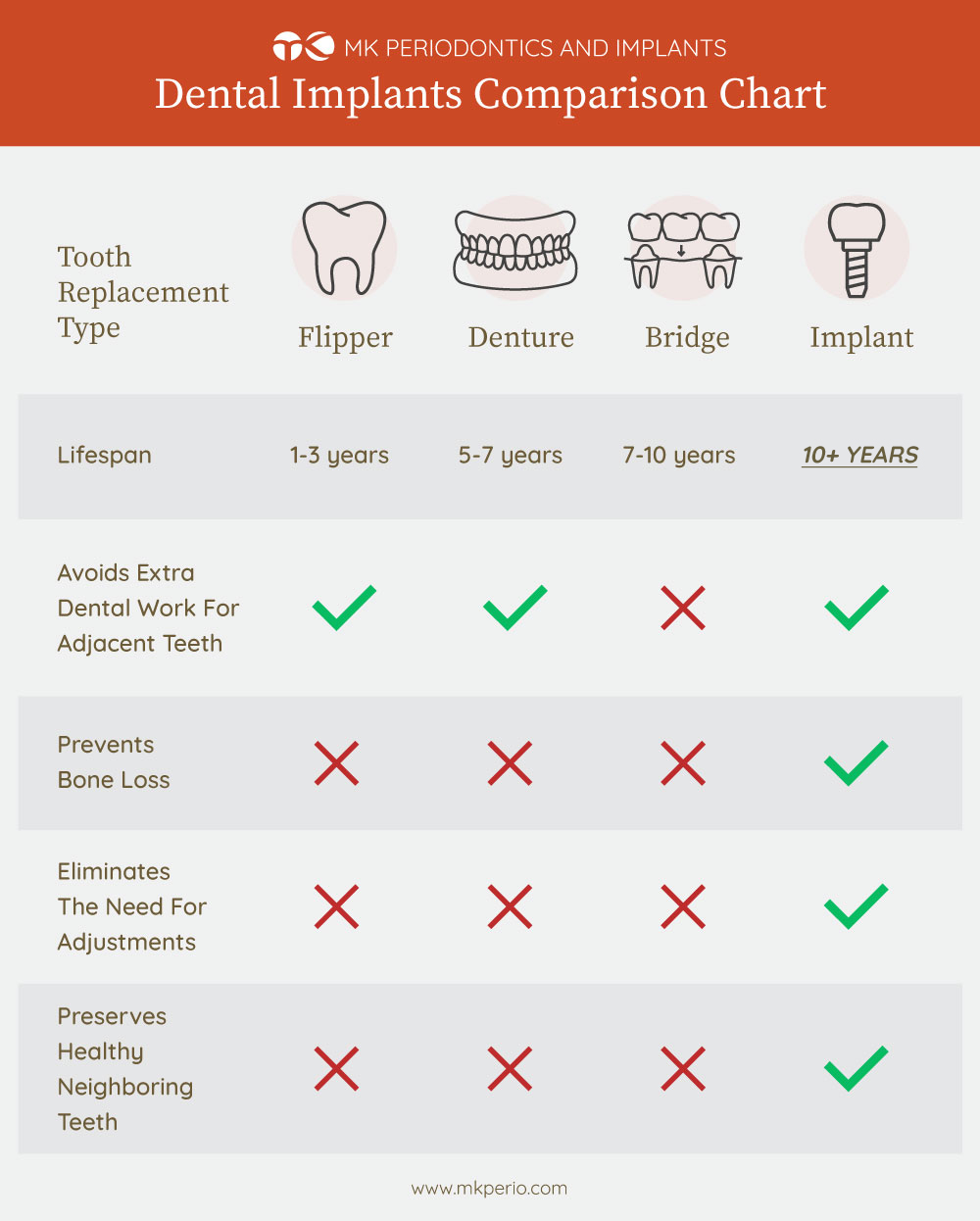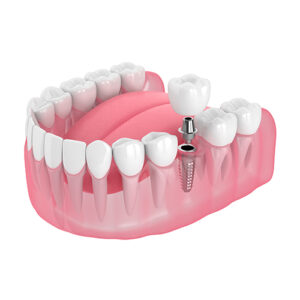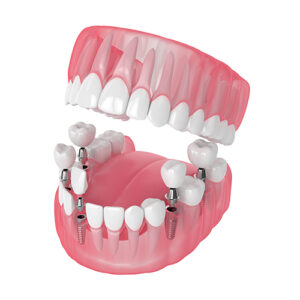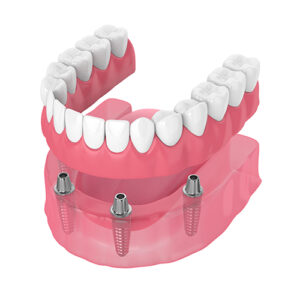
More Than A Dental Implant Consultation
Care is more than “treatment.” It’s having a doctor understand your needs beyond your oral health problems, providing you with the information you require, acting as a guide in your decisions, and ensuring you feel good about your choices.
At MK Periodontics and Implants, Dr. Karbakhsch and Dr. Katafuchi offer this definition of care to Tacoma patients. Our goal is to go beyond just restoring your oral health with dental implants – we aim to restore your entire quality of life by replacing damaged or missing teeth. Whether you need to restore one, several, or all of your teeth, they will prioritize your comfort and safety, and provide you with a durable, aesthetic outcome.
What Are Dental Implants?
During your visit to our practice, your doctor will spend time answering your questions and providing open and honest guidance about dental implants.
It helps to know the basics before exploring your options. Dental implants are artificial tooth roots that Dr. Karbakhsch and Dr. Katafuchi can surgically place below the gum line. Each implant can anchor one or more crowns, and several implants can work together to support a new, entire arch of teeth.
Dental implants give Tacoma patients an alternative to crown caps and dental bridges. The treatment conserves neighboring teeth, is durable and natural-looking, and restores much of your original tooth’s function.
Am I a Good Candidate for Dental Implants?
While Dr. Karbakhsch and Dr. Katafuchi are specialists who place dental implants on a daily basis, we know the experience isn’t as familiar to patients. That’s why we’ll take the time to explain the process, discuss your concerns, and make you a partner in your treatment. Our practice will care for you in the way that you want to be cared for.
Typically, Tacoma patients will receive a comprehensive examination during their visit and undergo a 3D CBCT scan. This advanced imaging technology is completely non-invasive and gives us a way to view the supporting structures of teeth more fully.
Whether you are seeing Dr. Karbakhsch or Dr. Katafuchi, we will answer any questions you may have about dental implants. Your doctor will also work closely with your restorative dentist to determine the recommended course of treatment. The care you receive will depend on a variety of factors:
- Whether you need one, several, or all of your teeth restored with dental implants.
- If the tooth is already missing. Your doctor may recommend bone grafting before placing the implant, in this case, to create a strong and durable foundation for the replacement tooth.
- If the tooth is damaged but still in place. Your doctor will need to remove the tooth and may need to graft bone to the area after the extraction.

What Should I Expect with Dental Implants?
Dental Implants for One or Several Teeth
We know that you want your smile back as quickly as possible. Dr. Karbakhsch and Dr. Katafuchi may be able to perform the first procedure in the dental implant process on the same day as your initial appointment.
During the surgery:
- You’ll receive oral or IV sedation so you can rest through the procedure. Feel free to get comfortable under a blanket and listen to music as the medication relaxes you.
- If there’s a damaged tooth in place, your doctor can remove it.
- Some Tacoma patients will have enough healthy bone to receive their dental implant the same day as their tooth extraction.
- Other patients will need time for bone grafts to heal and create a stable foundation for the dental implant. If you fall into this category, your doctor can still give you a temporary tooth so that you leave your appointment with a complete smile.
On average, patients need about three months after surgery for the implant to fuse before the next step in the process. At that point, they will visit their restorative dentist, who will finish their treatment by attaching permanent crowns to the implants. MK Periodontics and Implants will be there to coordinate every aspect of your care with you and your dentist.

Single Missing Tooth

Several Missing Teeth

For An Entire Arch of Teeth
Dental Implants for an Entire Arch of Teeth
Whether you receive dental implants to restore one or all of your teeth, you will benefit from the same level of support and comfort in your treatment. We welcome the opportunity to provide you with exceptional care.
As few as four dental implants can anchor a full denture, restoring many missing or damaged teeth in a single surgery. Our Tacoma patients who choose this option never have to go without teeth throughout the process.
For full arch restoration, your doctor may create a surgical guide, which will promote a high degree of accuracy and stability for your new teeth. MK Periodontics and Implants can use in-office equipment and trusted laboratories to prepare the guide and to create a temporary denture that will replace your teeth.
On the same day that your doctor places your implants, we will work with a lab specialist to refine and attach the temporary denture. You’ll leave our office with a complete set of teeth. You can expect to get your permanent denture in a follow-up procedure three months later.
Other Resources You May Find Helpful
FAQs
-
How Long After Dental Implants Can I Eat Normally?
The post-surgical wound is similar to a fresh “scab” – hard foods will irritate the scab, and delayed healing occurs. For the first week, eat a soft food diet to avoid disrupting the healing process. Chew on the opposite side of your mouth from the implant. After the sutures (if placed) are removed, you can cautiously resume normal eating habits. The instructions are specific to the individual and will be reviewed at your follow up.
-
What Foods Should I Eat and What Foods Should I Avoid After Getting Dental Implants?
After surgery, choose foods that require minimal chewing, such as broth, yogurt, oatmeal, mashed potatoes, scrambled eggs, and well-cooked vegetables or pasta. Avoid foods that are hard, crunchy, tough, sticky, or spicy, like raw vegetables, pretzels, steak, nuts, or gum.
-
What Are Zirconia Dental Implants?
Zirconia dental implants are an excellent solution for holistically oriented patients concerned about allergies, adverse reactions, and metal toxicity. These implants are entirely metal-free and demonstrate impressive healthy tissue integration.
Comprised of zirconium oxide, a ceramic material with a robust crystalline structure, zirconia dental implants offer a non-metal alternative to traditional titanium implants. Their naturally white appearance particularly appeals to patients seeking an aesthetically pleasing option that blends seamlessly with their teeth.
In addition to their visual appeal, zirconia implants are known for their durability. They can withstand significant amounts of force and remain inflexible under pressure, making them a reliable choice for those prioritizing health and aesthetics.
-
How Strong Are Dental Implants Compared to Real Teeth?
Titanium is incredibly durable, and dental implants can withstand nearly the same bite force as natural teeth because they are anchored to the jawbone, making them a sturdy tooth replacement option. Just as with your natural teeth, regular maintenance and dental visits are essential to long-term success.
-
How Often Do I Need a Checkup on my Dental Implants?
If you suffer from periodontal disease (approximately 50% of the world’s population), we recommend regular 3 months of supportive periodontal therapy at your dentist or periodontist office for best success. All other implant patients are recommended to see their dentist for maintenance therapy and exams every six months. Dental implants should be treated with the same care as natural teeth through professional dental exams, and regular exams can detect potential problems early on and keep teeth and gums healthy.
-
What Type of Anesthesia is Needed for Dental Implants?
Your comfort and ease during implant treatment means everything to us. Besides ”numbing “ the gums, we routinely offer oral sedation and IV sedation for our implant procedures.
-
Can Dental Implants Still Get Cavities?
No, dental implants do not cause cavities because crowns are made of an artificial material that is not damaged by bacteria or tartar like natural teeth. However, you can still develop cavities in adjacent teeth and “gum disease” around the implant (peri-implantitis), which may lead to bone loss as around natural teeth.
-
How Long Should I Wait to Get Dental Implants After an Extraction?
In some cases, dental implants are placed immediately at the time of extraction.
With infections or on teeth with significant bone loss, the extraction site will need to heal for a minimum of 3 months before it is recommended to place the dental implant. Our “biology” is non-negotiable – everything else is. The waiting period is typically 10 to 12 weeks to give the empty socket time to heal. -
Why Are Dental Implants a Better Option Than Dentures?
Because dental implants are anchored in the jaw bone, they mimic a natural tooth replacement with which you can chew comfortably. Lower dentures often fit loosely and slip out of place due to extensive bone loss. With the help of only 2 dental implants, these dentures can be stabilized and help you chew food and speak once again comfortably.
Restore Your Smile with Dental Implants in Tacoma, WA
Reach the implant specialists at MK Periodontics and Implants in Tacoma, WA, online or by phone at (253) 752-6336 to schedule your appointment.



